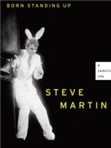 Steve Martin’s Autobiography starts with the following phrase:
Steve Martin’s Autobiography starts with the following phrase:
“I did stand-up comedy for eighteen years. Ten of those years were spent learning, four years were spent refining, and four were spent in wild success… enjoyment when performing was rare - enjoyment would have been an indulgent loss of focus that comedy cannot afford. After the shows, however, I experienced long hours of elation or misery depending on how the show went…”
I spent the first ten years of my testing career learning, since then I’ve spent the years refining and learning. I haven’t enjoyed the wild success yet. But then I test software rather than perform stand-up comedy… but on some projects- who can tell the difference?
The learning experience that Steve Martin describes relates fairly well to many jobs, but I want to point it out to software testers because many of us don’t go the extra mile that Steve Martin attributes to his success.
First we learn from other people.
Steve describes in detail how he watched other people work, listened to their acts, recited them verbatim, studied the timing, used their jokes, learned their techniques.
I can not imagine a single tester who could not put this approach into practice: read some books, read some blogs, look for experience reports and put their descriptions into practice.
Use this ’learn the basics’ stage as a starting point.
Learn the basic techniques, get them down pat.
Then move on - do not get stuck here.
Then we learn by working with other people.
Work with more experienced testers.
Experiment with less experienced testers.
Learn from everyone.
I learned so much by working on teams with more experienced testers. And when I worked on teams with less experienced testers, we had nothing to lose and we could experiment wildly - what a great way to learn.
Experiment and try out new things.
Testers are made, not born.
“But there was a problem…I had absolutely no gifts. I could not sing or dance… Thankfully, perseverance is a great substitute for talent.”
Reflect on what you do
Steve Martin shows some of his notebook pages in his book and describes his self critical process of making notes on what worked, what didn’t, and what to try next.
Incorporate this practice into your test process. Learn from your mistakes. Learn from others’ mistakes. Tweak what you do and observe the results. ‘Be’ your own experiment.
Study other disciplines and incorporate them into your discipline
Steve Martin studied philosophy and incorporated elements of that into his act.
The process of studying philosophy also changed they way that he approached the analysis of comedy and viewed his act.
We can’t predict exactly how the study of other disciplines will affect what we do. We just know they do.
So do this.
Build theories and models of what you do, then break them
Steve Martin studied other people’s theories about comedy. Then built his own models and pushed them and pushed them until he had created his unique style.
I eventually had to unlearn many of the things I learned from more experienced testers. The construction of my own models helped move me forward and helped me take responsibility for my own testing theories. I could no longer rely on the “call to authority” to convince others. I had to believe in my own models and learn how to convey them effectively.
I continue to learn how to convey them, because those models keep changing.
To do this - try and explain aspects of your craft to other people. Find new ways to view what you do. Stop using words like “Functional testing”, “Integration testing” - find new ways to express what you think you mean when you say those words.
Keep learning - and not just learning from other people - learn from yourself.
Keep experimenting
Keep bringing new things into your act. Try out the new techniques and routines on the smaller crowds. However you choose to do it, keep bringing new techniques, approaches and thought processes into what you do.
Recognise when you stop advancing
Steve Martin describes in detail what happened when he got successful. That the system of success stopped him moving forward with his comedy and stopped him enjoying what he did. Steve Martin moved into films.
If you get to this point then perhaps you need to change: your industry, or your role - if you currently work as a team lead, perhaps you need to spend some time as a manager, if you have ‘mastered’ manual testing then perhaps you could automate. Choose to change.
When all else fails, wear an arrow through the head
Uh-oh! I’m getting.. Happy Feet! See, every once in a while that happens, I have no control over it. Sorry. Okay. We’re moving along now.







